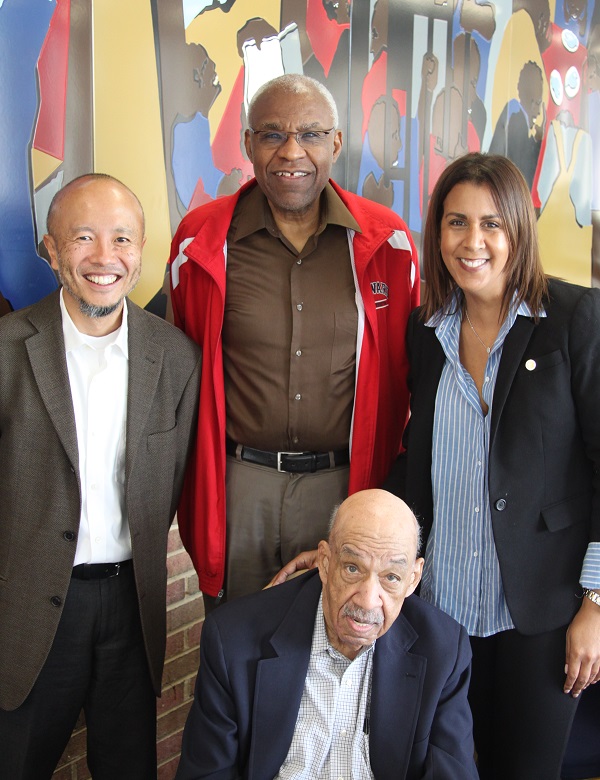Neuropsychology
Psychology (Neuropsychology Specialization) |
Neuropsychology Specialization
Our department offers didactic and research training in Neuropsychology Specialization at the doctoral level. This program provides students with a scientific understanding of human behavior as it relates to normal and abnormal functioning of the central nervous system. It also introduces students to a wide range of procedures and techniques used to study the neural bases of cognitive, affective and behavioral processes. This program focuses on the dynamic interplay between the brain and physical health, especially as this relationship is brought to bear on issues related to racial and ethnic health disparities. It is strongly research-oriented, so students are required to initiate a research project in collaboration with a faculty member early in the first year of graduate study. The goal of our program is to equip students for research careers as neuropsychologists in academic and research settings. In the past, our students have been involved in research collaborations in the Departments of Psychiatry, Neurology, Neurosurgery, Pharmacology, Surgery (Bariatric and Transplant), and Human Genetics in the Medical School and Communication Science and Disorders, Biology and Human Performance and Leisure Studies in the Graduate School. Students have also conducted their research with research mentors at the National Institutes of Health.
During their first year in the program, students are assigned a research advisor who will help them select courses and training appropriate to their goals. In their first year, students are expected to complete 1) a one-year sequence of statistics, 2) a two-semester first year research course and a one-semester course in research methods. They are also expected to complete six or seven advanced neuropsychology courses. Students are also required to complete a minor in one of the following areas: personality, statistics, social, or developmental psychology. The choice of a minor should be related to the professional goals of the student. To assure achievement of breadth of knowledge of psychology outside the major and minor specialization, students are required to take a breadth course in each area of specialization.
Faculty Interests

Ezer Kang (standing on left), examines the relationship between neighborhood factors and neuropsychological functioning among adolescents living with perinatal HIV (PHIV). His PHIV research in Thailand focuses on the impact of neuropsychological delays on daily functioning and health-related quality life.
Alfonso Campbell, Jr. (standing at center), is primarily interested in the psychoneuroimmunological correlates of health and disease. Currently his work focuses on the relationship between obesity-related inflammation and the brain’s functional integrity. He is also developing a model of health and well-being that takes into account biological, psychological, social, and spiritual factors.
Denée T. Mwendwa (standing at right), examines the effects of cardiovascular disease risk factors on the neurocognitive aging process in African Americans. She is also interested in the psychoneuroimmunological factors that help explain CVD risk in African Americans. Her current research project focuses on the effects of obesity on neurocognitive functioning in African-American bariatric patients.
Leslie H. Hicks (seated), has been awarded Emeritus status at Howard after a career as a pioneer scientist, educator, graduate mentor, and administrator at Howard University for 62 years. Dr. Hicks was one of the founders of the first accredited doctoral program in clinical psychology at an HBCU, and has been an active promoter of Black Studies as a scholarly discipline and of increasing diversity in science. His tireless and unyielding advocacy of progressive ideas has expanded the educational opportunities of generations of African-Americans. Dr. Hicks was one of the first African Americans to receive a Ph.D. in behavioral neuroscience. His accomplishments in program development, teaching, and research have made him a legend in his own lifetime.
Cousework Sequence
First Year
First Semester Second Semester
Neuropsychology Topics in Neuropsychology
Statistics I Breadth Requirement
Research Methods Statistics II
First-Year Research First-Year Research
Second Year
First Semester Second Semester
Psychopharmacology Health Neuropsychology
Master’s Thesis Master’s Thesis
Minor Breadth Requirement
Methods in Psychophysiology Neuropsych. Assessment
Third Year
First Semester Second Semester
Elective: Neuroanatomy or neurophysiology Cognitive Neuropsychology
Minor Neuropsychology Seminar
Breadth requirement Minor
Health Psychology Minor
Fourth Year
First Semester Second Semester
Dissertation Dissertation
Address:
Department of Psychology Howard University
525 Bryant Street NW
Room N-179, CB Powell Building
Washington D.C. 20059
Contacts
Program Details
- Related Degrees: Ph.D.
- Program Frequency: Full-Time
- Format: In Person
